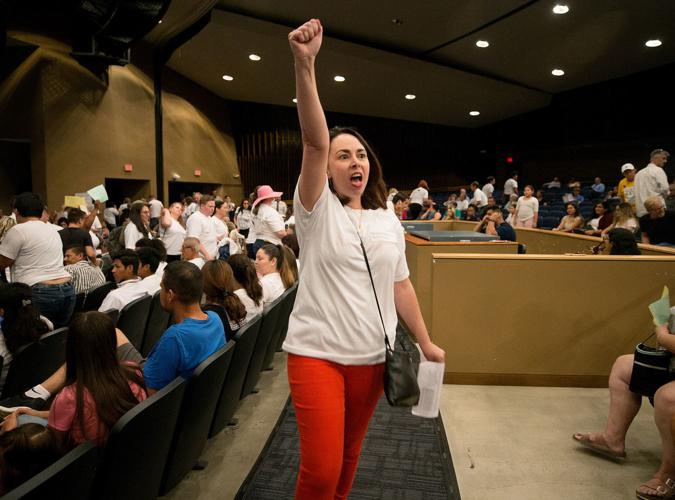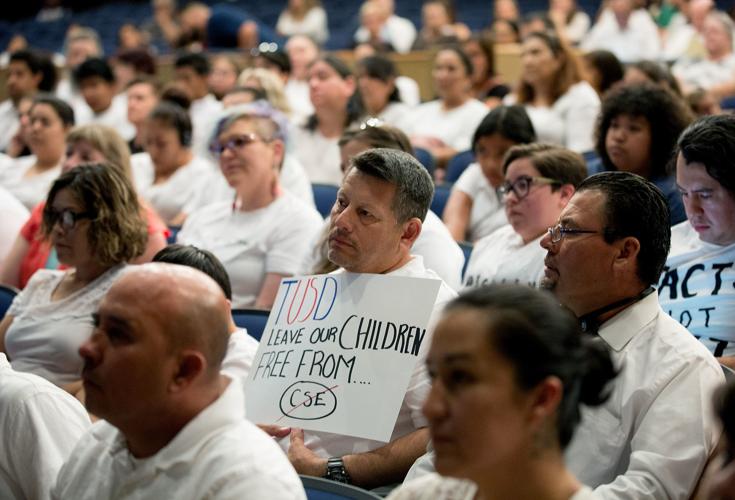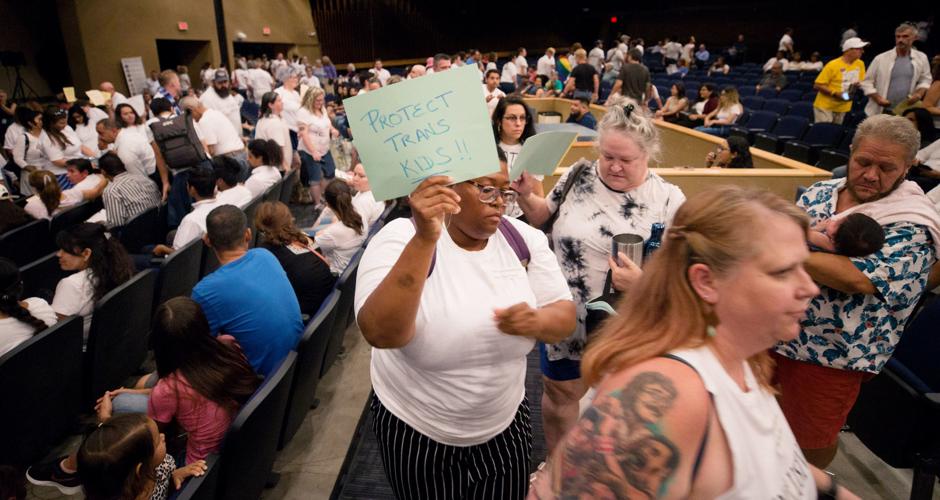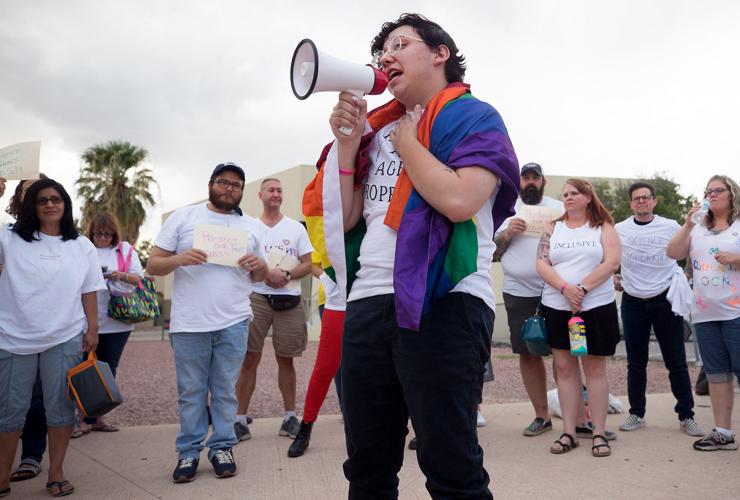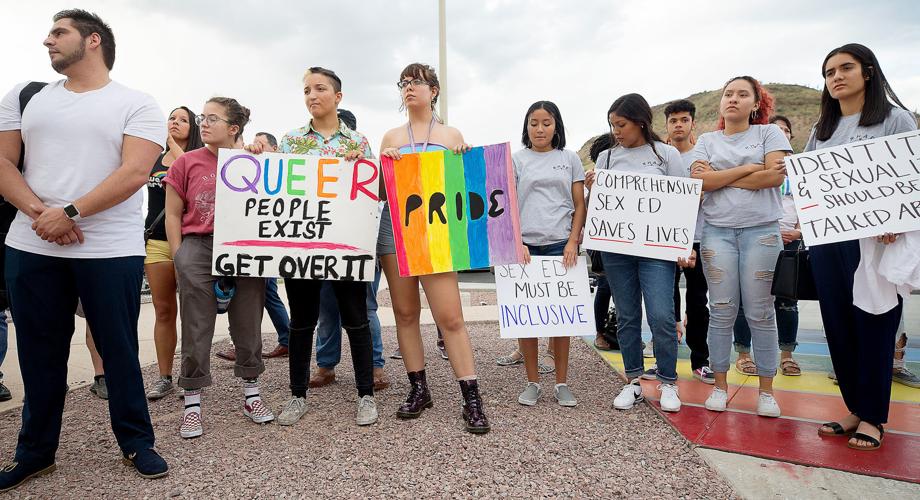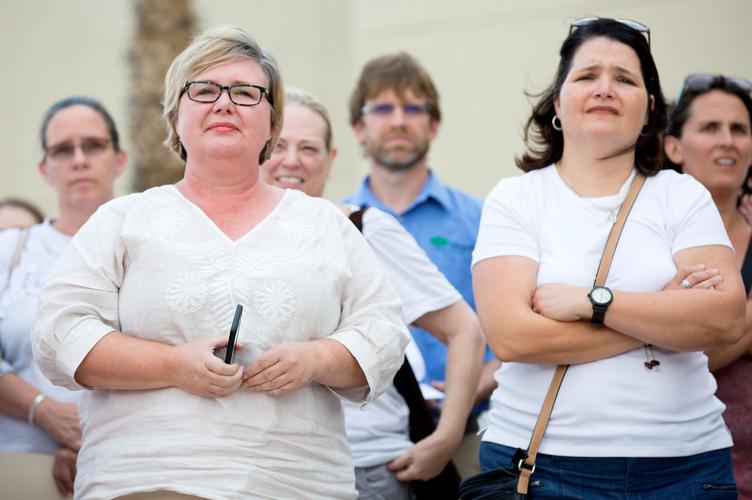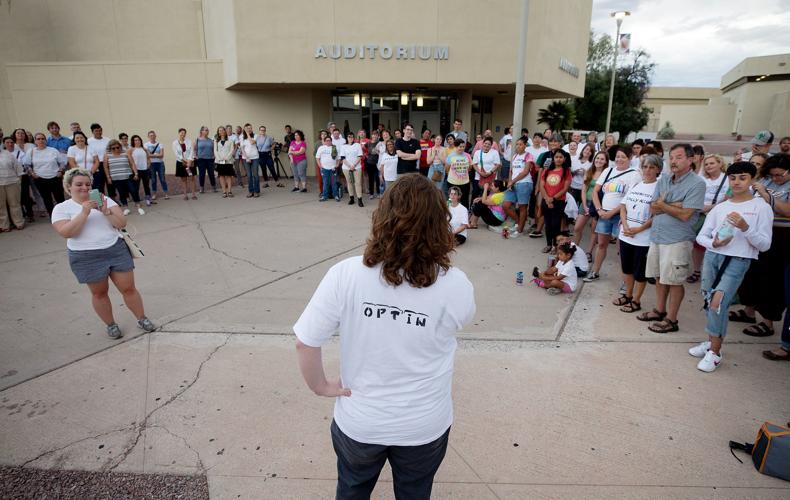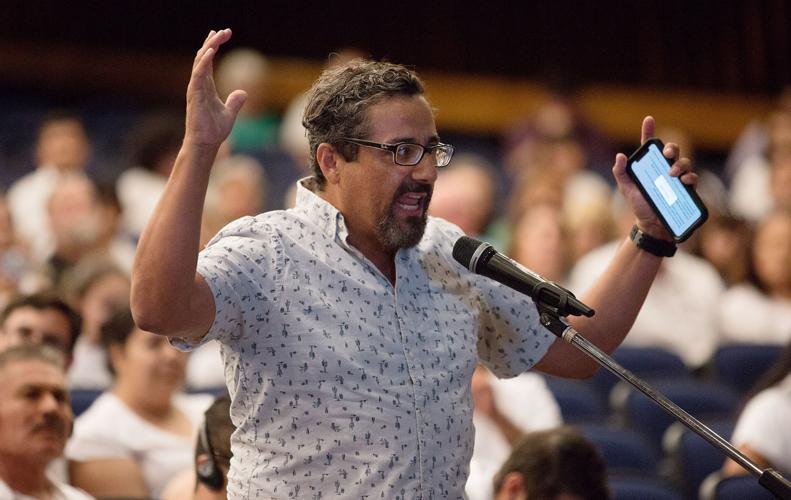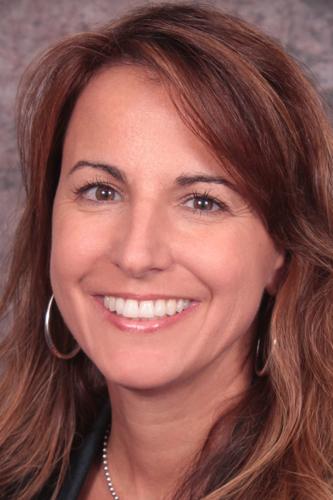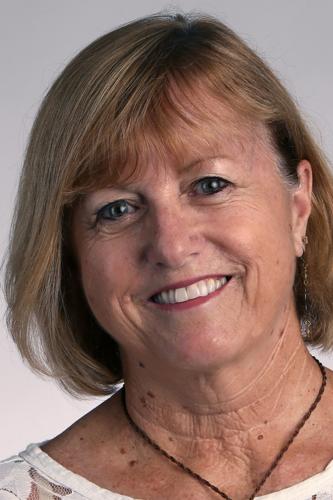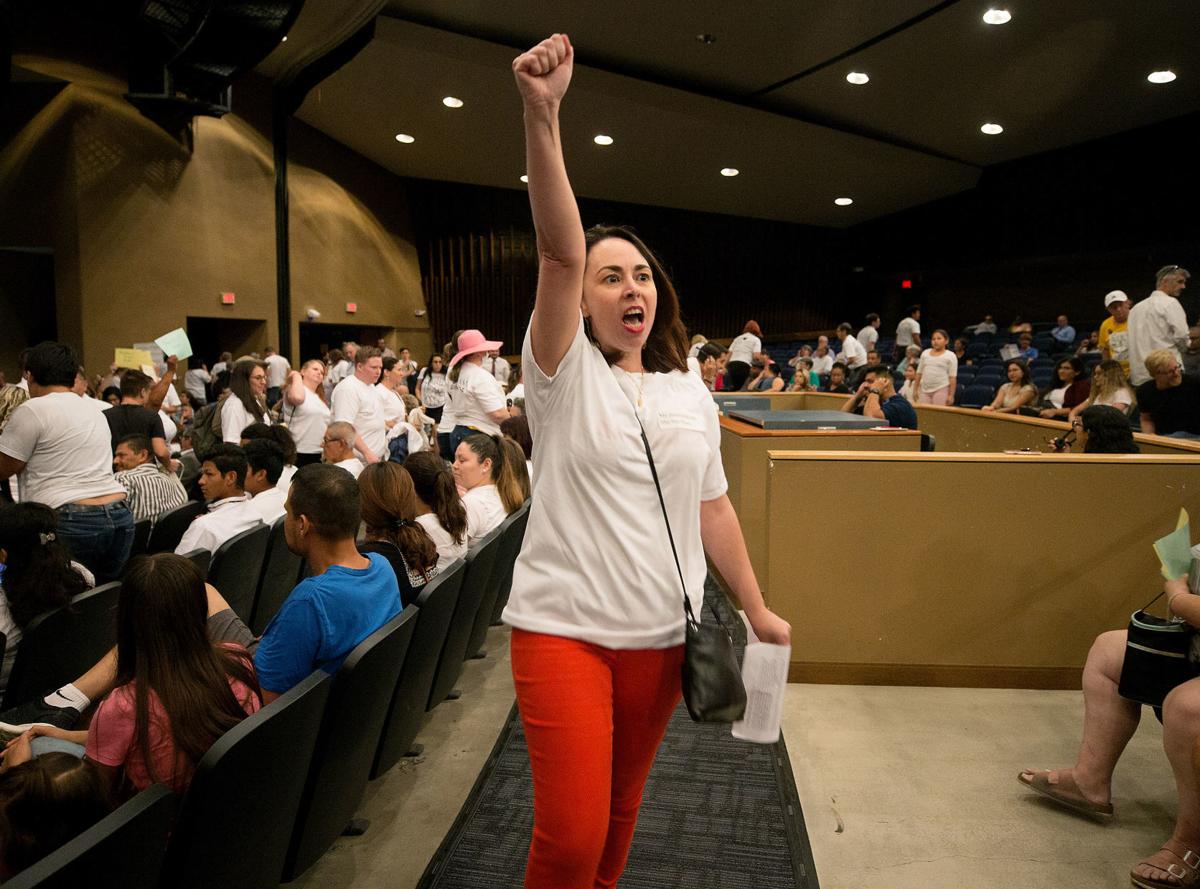Correction: Dr. Ravi Grivois-Shah was appointed to the Family Life committee by board member Kristel Foster.
A volunteer committee wrote an update for TUSD’s Family Life Curriculum, which includes sex education, with the goal of creating lessons that are medically accurate, age-appropriate, comprehensive and inclusive.
Adopting the opt-in curriculum has devolved into long public hearings where opponents often complain about the curriculum defining terms such as gender identity and gender expression, acknowledging transgender students. Other opponents say sex education should be taught by parents rather than school.
About 200 people in support of the curriculum staged a walkout during the final public hearing on the changes Thursday at Cholla High School.
TUSD mom Carol Brochin led the walkout, saying that comments at the hearings violated the district’s nondiscrimination policy, which bars discrimination for reasons of sexual orientation and gender identity and expression. Brochin invited people to hold their own public forum outside on the rainbow walkway that leads into the school.
Brochin, the mother of a nonbinary and transgender middle-schooler who was a plaintiff in a lawsuit against the state for strict regulations around how teachers could talk about homosexuality during sex ed classes, said the forums “have been co-opted to mobilize a public attack against the LGBTQ+ community and the safety of trans youth.”
“The validity and existence of the gender identity of our children is not up for debate,” she said. “To do so would be to engage in the discrimination of our own children.”
Meanwhile, a letter is being circulated calling for the removal of one of the Family Life committee members who helped write the curriculum. Bernadette Gruber recently appeared in a video, which links the curriculum to Planned Parenthood, and says in it that “so-called inclusive curriculum is teaching harmful gender ideologies.”
The high-quality nine-minute video was made by a group called Protect Arizona’s Children Coalition. Gruber is an admin on the group’s Facebook page, which was created at the end of June.

Critics of the proposed Family Life Curriculum say it prepares children to have sex and that its references to gender identity are not appropriate for impressionable students.
Gruber said in an email that she appeared in the video because the group asked her to do so and that she felt the public needed to know “some of the harmful elements being proposed.”
Gruber said she is a member of the coalition but doesn’t know what the video cost or who made it, though she believes it was made by volunteers.
Some people speaking against the curriculum at hearings are members of 4Tucson, which seeks to find biblical solutions to city problems. Gruber is a member of that group.
Gruber, who would answer questions from the Star only by email, said she invited as many people as she could to the hearings and encouraged them to share their opinions.
“That is what public forums are for,” she said. “I also realized the faith-based community needed to have a voice.”
The TUSD parents who wrote the letter seeking to oust Gruber say people opposed to the changes are pushing the conversation away from the curriculum and making the forums unsafe for their children by questioning “the validity and existence of trans people.”
“I believe by principle alone that all students should have access to information that guides their bodies, their relationships, their identities and their safety and security in life,” said Megan Mogan, a mother of three TUSD students and a public-school educator who helped draft the letter. “Just human principle alone got me involved in supporting the curriculum.”
The TUSD proposed curriculum wasn’t bought from Planned Parenthood or any other organization, but was written by a group of community leaders — lifelong educators, faith leaders, education advocates and a family doctor. Appointed by the TUSD Governing Board, the committee had the help of curriculum specialists and people versed in the law around what can be taught in sex ed.
Here’s a look at the views and expertise each committee member brought to this process.
Ravi Grivois-Shah
Dr. Ravi Grivois-Shah provided primary care for at-risk teens at a high-school-based health center in Chicago, a decade ago while working in the county health system there.
The school had one of the highest teen-pregnancy rates in the state, as well as high rates of Chlamydia, he says. Grivois-Shah said the abstinence-only sex education the students received was inadequate to meet their diverse needs.
“I would see students regularly coming in completely without any knowledge of how to prevent pregnancy, how to prevent disease and the consequences of that,” he said. “That was a really eye-opening experience for me.”

Dr. Ravi Grivois-Shah
Grivois-Shah was appointed by board member Kristel Foster in March to ensure the update was medically accurate.
Grivois-Shah has been a family physician for 14 years. He serves on the Board of Directors for the Arizona Academy of Family Physicians and served two years on the Board of Health in Oak Park, Illinois, before moving to Tucson in 2014. He’s also a father of three, a TUSD parent and is running for the TUSD Governing Board.
Grivois-Shah says the current curriculum, which was first adopted in 1996 and updated in 2006, has inaccuracies as well as stigmatizing and shaming language.
He guided the committee in removing and rewriting outdated lessons to include accurate and age-appropriate information.
As well, the way the medical community treats transgender patients has evolved during Grivois-Shah’s career to be more empowering and patient-centered. An inclusive curriculum, which includes LGBTQ students, is important to meet those students’ needs and to remove stigma, empowering the entire student body with knowledge of the world around them, he said.
“We should have comprehensive sex ed because it improves outcomes for students. We should be talking about LGBTQ issues because it going to benefit all students, and every organization agrees,” he said. “There is no disagreement in the mainstream medical community on these issues.”
Grivois-Shah said there is still room for improvement in the new curriculum, but the finished product is strong and the board should vote to adopt it.
“It’s medically accurate, it’s comprehensive, it is age-appropriate, and it’s appropriately inclusive,” he said. “I think it’s better than what we had before, and I think it will do good to really meet the needs of our students and help reduce the cycle of fear and misinformation — if implemented well.”
Cindy Coleman
Cindy Coleman began her 37-year career as an educator teaching English and physical education and coaching gymnastics at Cholla High. She taught at a number of TUSD schools and was a swim coach and a track assistant. After she retired in 2014, she stayed with the district for another year and a half as the curriculum specialist for physical education and health.
Coleman has two grown children who graduated from TUSD schools and became educators themselves.
Besides being an educator, Coleman has worked with the Arizona Republican Party for 40 years and is second vice chair for the state.

Cindy Preble Coleman
She was first appointed to the Family Life committee in August 2016 by then-board member Michael Hicks. The committee disbanded after two years. When it reconvened in March of this year, Coleman was appointed by board member Rachel Sedgwick.
In creating the curriculum, Coleman says the group didn’t use any tools from national organizations like Planned Parenthood but rather produced something by and for the TUSD community while adhering to state law.
The committee looked at how to promote conversations between students and their families and enhancing life skills, such as good decision making, she says.
For Coleman, gender inequity affected her entire career as a female coach at TUSD. She says if she had known terms like gender equity and sexual harassment, she may have been more equipped to advocate for herself. The high school curriculum has a lesson on sexual harassment and abuse. Coleman says while creating the curriculum was a messy process, she’s happy with the final product.
“We need to be further along in the conversations that these kids need to have than we are right now,” she said. “And if we don’t catch up then we become irrelevant as an educational institution.”
Stephanie Hamilton
Stephanie Hamilton has been working on the Family Life curriculum for three years. When she began, she had three children in TUSD schools in each of the curriculum age groups. Now, her oldest will graduate before the curriculum is taught. She knows it so well, she could teach it to him at home, she says, laughing.
She’s joking about teaching the curriculum at home, but her home life did contribute to the curriculum. Her experience as a mother helped her understand where children needed guidance.
Hamilton is an education advocate and an ordained minister with Presbyterian Church USA. While not an educator herself, she’s married to a third-generation educator, both her parents were educators and her siblings married educators. She calls it the family trade.

Stephanie Hamilton
Education funding has been an important issue for her since her oldest began kindergarten. She was one of the initial members of the Tucson Unified Parent Advocacy Council, which advocates for the district at the legislative level.
In 2018, she was the regional lead for Save our Schools, the grassroots referendum campaign that successfully stopped the expansion of the state’s Empowerment Scholarship Account Program, which would have allowed more parents to use public funds on private school tuition. And Hamilton has done advocacy work for KidsCare, the state-subsidized children’s health coverage.
She is also running to represent Tucson in the state Legislature.
She says TUSD board member Kristel Foster appointed her to the committee in 2016 because of her advocacy work with education and connection to the faith community.
“I certainly have a stake in the game both from my faith-based community but also for my children,” she said. “I definitely have leaned in, to fight for what’s necessary for our children.”
Hamilton wanted to make sure any inaccuracies or outdated language in the original curriculum was corrected. She also wanted to have as broad a curriculum as possible, with inclusivity at the forefront.
It was important that the curriculum validate each person’s experience, whether that be LGBTQ youth or children who don’t have parents or guardians to turn to, she says.
Creating the curriculum was a democratic process and the finished product is far better than what it was, with consistent and coherent language throughout, she says.
Bernadette Gruber
Bernadette Gruber, who would answer questions only by email, has been doing community work around education for the last 14 years. Much of it has centered around bringing Christianity into public schools.
For the last eight years, she’s served as education domain director with 4Tucson, a faith-based organization that believes in finding biblical solutions for city problems. The organization’s 2018 winter magazine says “The Education Domain envisions every Tucson-area school being served by Christian churches and ministries to the benefit of all students and families.”
She was a coordinator for the national organization Gateways to Better Education, which promotes Christianity in public schools.

Bernadette Gruber
Gruber has also been involved in TUSD’s anti-bullying event Impact Tucson and the Steps to Success program, which helps students who have dropped out of school come back and graduate.
She was appointed to the Family Life committee in 2016 by former TUSD Superintendent, H.T. Sanchez. She said she believes he appointed her because of her work with the faith-based community and as a mother who cares deeply about children.
“While I don’t reside within the district, through my job with 4Tucson in my capacity as the education domain director, I served as a liaison between TUSD schools and the Tucson faith community, connecting churches to various TUSD schools to conduct service projects,” she said.
Board member Mark Stegeman said he was going to appoint Gruber when the committee reconvened this year, but he didn’t have to since she was already on the committee.
Gruber said the process of updating the curriculum was disorganized and confusing, and she felt like she was the “token faith-based community representative.”
Gruber and committee member Cheryl Gerken wrote the high school curriculum together, but Gruber says she was opposed to the “more controversial elements.” Among them is the definitions to do with gender identity and gender expression, which she says “gives impressionable students the false idea that they can be something other than male or female.” She is also against teaching consent, and says the curriculum should emphasize abstinence only.
She said the curriculum has many positive elements, but she thinks the board should not approve it unless the parts she considers harmful are removed.
“While the curriculum repeats the same sentence about abstinence in a few places, the curriculum taken as a whole largely focuses on preparing children to have sex,” she said. “It also describes various sex acts that many parents find offensive. In addition, the curriculum fails to focus on the many health benefits of delaying sexual activity until adulthood and fails to encourage a return to abstinence if a child has already engaged in sex.”
Cheryl Gerken
In part, Cheryl Gerken got involved because of her daughter’s frustration with the sex ed she received in a TUSD high school — a short lecture about abstinence, she said. And her daughter received no sex ed in middle school.
During Gerken’s career at TUSD and through her children’s experiences, she saw that some schools taught sex ed or family life and others didn’t, which she says is a matter of equity — that all children have access to the same education.
Gerken was a bilingual K-8 teacher in TUSD schools for three years in the late ’90s. As a fourth-grade teacher, she taught Family Life. Besides teaching anatomy, she talked to the kids about relationships, self-value and self-introspection.

Cheryl Gerken
“The discussions we were able to have were really fruitful, and the kids really got a lot out of it,” she said. “I believe it was very life-changing for those kids.”
After a break to raise her children, she went back to TUSD as a bilingual librarian for another eight years.
Board member Leila Counts appointed Gerken to the committee this year. In writing the high school curriculum, she and Gruber drew from many online assets, Gerken said. She emphasized that they never went to any Planned Parenthood website while creating the curriculum.
One of the biggest changes is the addition of media influence and the peer pressure it can create in teenagers’ lives.
“A lot of the lessons talk about personal fortitude and really learning how to think about negative influences and identify somebody or something that is a negative influence in your life,” Gerken said.
The actual sex-ed portion is a small part of a curriculum that mainly emphasizes relationships, overcoming peer pressure, empowerment, self-esteem and autonomy, she says.
While Arizona is in the midst of a syphilis outbreak, with 10 babies who died from congenital syphilis in 2018, Gerken says students need information to make healthy decisions and protect themselves.
“We are in 2019; this is not 1940,” she said. “We have access to all of this information yet we’re still having problems with sexually transmitted infections. That’s pretty crazy to me. That’s one of the effects of not having a good educational program around relationships and sexual education in our state.”
Adam Ragan
Adam Ragan says his understanding of teaching teenagers is one of the things he brought to the curriculum-writing process.
“Seventeen-year-olds are pretty discerning,” he said. “If you lie to them once, you’ve lost them forever. I don’t lie to my students because I need them to trust me.”
Ragan, who was appointed this year by board member Adelita Grijalva, teaches senior English in the Sunnyside Unified School District as well as a dual-enrollment writing class.
Before joining Sunnyside two years ago, he wrote curricula while teaching at community colleges, and he taught family life classes to high school students while working for the Southern Arizona AIDS Foundation.
Ragan has had students who are gender non-conforming, and he’s seen the struggles they face.

Adam Ragan
“If you fit the binary, it’s really hard to understand how somebody doesn’t fit into that,” he said about gender identity. “If you don’t fit the binary, it’s really hard to understand how you fit into the world.”
Ragan lost a bid for the TUSD Governing Board in 2018, garnering more than 40,000 votes. He plans to run again in the 2020 race. During his 2018 campaign, he talked about updating the Family Life curriculum and saw that having something more comprehensive and inclusive was important to people.
He’s pleased with what the committee created and said it’s important the district create an online version for students who take their health classes online.
Also, having a group of dedicated volunteers write the curriculum saved the district money, he said.
“The district could have gone out and bought a curriculum for $500,000,” he said. “Instead, we had volunteers who showed up after work. I would teach all day and then go to these committee meetings. I would write curriculum after work, and I did it out of love for this district.”

After Carol Brochin made a speech to the school board about 100 people walked out of the public hearing for Tucson Unified School District’s new Family Life Curriculum at Cholla High School, 2001 W Starr Pass Blvd., on August 22, 2019. Supporters walked out of the meeting in protest because of the way members of the LGBTQ community were talked about during the prior meeting.

Ciro Wagner, 19, who identifies as trans, speaks to the group of supporters who walked out of the public hearing for Tucson Unified School District's new Family Life Curriculum at Cholla High School, 2001 W Starr Pass Blvd., on August 22, 2019.

About 100 people walked out of the public hearing for Tucson Unified School District's new Family Life Curriculum at Cholla High School, 2001 W Starr Pass Blvd., on August 22, 2019. The group stood outside of the meeting and listened to speakers in support of the proposed curriculum.

Kristel Foster, left, says her first goal as new TUSD governing board president will be to see the district create a new five-year strategic plan.

About 100 people walked out of the public hearing for Tucson Unified School District's new Family Life Curriculum at Cholla High School, 2001 W Starr Pass Blvd., on August 22, 2019. The group stood outside of the meeting and listened to speakers in support of the proposed curriculum.

Eli Moreno speaks in opposition to the proposed Family Life Curriculum during a public hearing in front of Tucson Unified School District's school board at Cholla High School 2001 W Starr Pass Blvd. on August 22, 2019.


